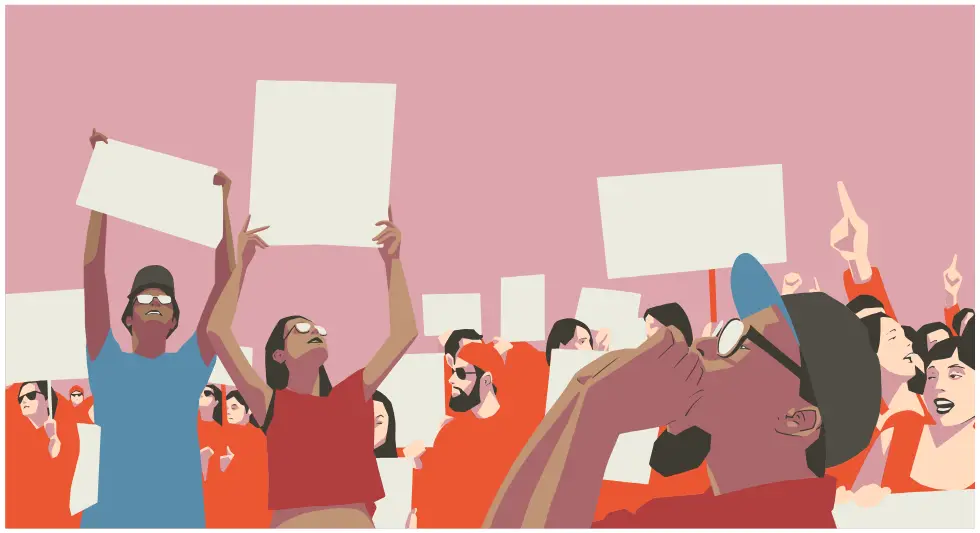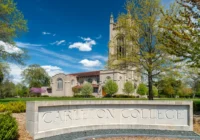US media spent much of the second half of April focused on unfolding events at Columbia University in New York City. It all began on April 17 with a peaceful demonstration that quickly affirmed its seriousness as a protest against an unfolding genocide and established its ephemeral institutional status as “the Gaza Solidarity Encampment.” The drama reached a climax after the university’s administration called in the city’s police force to “restore order.”
The drama that played out over two weeks in NYC inspired similar demonstrations in campuses across the nation. Though the police effectively cleared Columbia out, the protests and encampments are continuing and are likely to continue in New York and elsewhere. Depending on external events (notably in the Palestine itself) there may even be a buildup of tension culminating, like in 1968, in protests at the Democratic Convention, coincidentally planned to take place this summer in Chicago as it did 56 years ago.
That is not a prospect anyone in the establishment relishes. Predictably, the immediate response articulated by practically everyone in a position of authority has been to seek a way of nipping the protests in the bud. That at least is how New York City’s mayor and former police captain, Eric Adams saw it when he explained: “There is a movement to radicalize young people, and I’m not going to wait until it’s done and all of a sudden acknowledge the existence of it.”
He doesn’t want to “wait until it’s done” and be caught be surprise. Time may not be money in this case, but to his mind, it is security. The status quo will always fear radicality, even when the same status quo is quite happy chugging along with an unfolding genocide.
Today’s Weekly Devil’s Dictionary definition:
Radicalize (young people):
Allow a generation to develop a moral conscience concerning questions the previous generations have struggled mightily to remove from their field of awareness.
Contextual note
Mayor Adams called the crackdown “a necessary response to chaos perpetuated by external actors.”
We might expect Adams’ impatience with visible disorder within the city’s precincts to be the logical choice of a former police officer, but not necessarily of politicians, and certainly not educational authorities. Universities have traditionally held a special status in US culture, which sees them as not entirely dissimilar to churches. Many people believe a university’s student body, composed of inquiring adults, should enjoy a margin of maneuver greater than elsewhere in society. Colleges are spaces charged with fostering intellectual liberty.
Times have clearly changed. The Washington Post describes the attitude that a majority of university administrations now assume, closer to privileging censorship than freedom of thought. “As pro-Palestinian student protests surged in the past week, universities responded with consequences not imposed en masse for decades: suspensions, expulsions and arrests, hoping to tamp down a spiraling movement that has inflamed passions on all sides.” After evoking historical protest movements from the war in Vietnam to South Africa apartheid, the Post adds this observation: “Nothing since then has come close to this sort of disciplinary crack down.”
Caitlin Johnstone has documented the effort made by media as diverse as The Wall Street Journal, MSNBC, The Washington Times and, of course, politicians and the New York Police Department, intent on instilling the idea that sinister forces are at work seeking to subvert the peaceful order all US institutions are committed to. We inevitably learn that “that foreign governments are behind this new protest movement to radicalize young people against Washington and Israel” and, as Johnstone notes, we now consider normal “that it is the job of the police to control the spread of unauthorized political opinions.” This used to be considered a feature of totalitarian regimes.
To get a better grip on the change that has taken place, I suggest a thought experiment that appeals to counterfactual history. Imagine we’re back in the early 1940s in Hitler’s Germany. Some groups of students have learned that their nation has a secret program to round up and exterminate the “inferior races.” Appalled by the injustice of such a plan, some of the students decide to protest with the idea of drawing the general population’s attention to their passive complicity in a genocide. Knowing what we know about the Nazi regime, no one could doubt that the protests would have been short-lived. The Gestapo would waste no time suppressing them.
With no social media at the time and full control of all available media, the Nazis had little to fear. They had the enormous advantage of being able to hide their genocide from their own population. But what if these imaginary students had learned about it and attempted to protest it? What would today’s history books say about them?
Not only would these “radical troublemakers” be hailed as heroes and martyrs for human rights, but we would also qualify their behavior as exemplary and point to them as models to emulate. They alone would be pointed for courageously standing up to the challenge of their time.
Nazi genocide was invisible because no one was allowed to see. Today’s genocide is, for some, invisible because they don’t wish to see it.
Historical note
There’s nothing new about student protests. In some ways, today’s movement resembles the spectacular events that roiled American civilization in the 1960s. In others, as we shall see, the resemblance is real but only superficial.
In the first months of 1968, President Lyndon B. Johnson, who earned his reputation as an effective reformer — the champion of a “war on poverty,” civil rights and the “great society” — had committed the nation to what people increasingly perceived as an unwanted, unwinnable and immoral war in Vietnam. The generation of youngsters who were expected to participate in that war not only rejected the politics that would oblige them to go halfway around the world on a mission to murder people who in no way threatened them, but they called into question the conformist, productivist and consumerist culture that the authorities and their parents expected them to gratefully embrace.
The long-haired hippies had lost faith in crewcut culture. The civil rights movement clued them into the fact that WASP culture (White Anglo-Saxon Protestant) could be and maybe even had to be oppressive. The war in Vietnam, launched to prevent theoretical dominoes from falling, threatened their very lives. Their rallying slogan became: “Tune in, turn on, drop out.”
Sixty years later, it thus appears striking that Columbia University, the epicenter of the anti-war movement in 1968, should emerge as the locus of a movement that has now spread across dozens of campuses to protest not against a foreign war initiated by the US, but this time against the nation’s passive complicity in a perceived genocide. Eric Clapton’s group The Cream summed up the feelings of the epoch: “I found out today we’re going wrong.” There was a vague sentiment that we had gone adrift. In contrast, today it’s about the specific reality of a visible genocide taking place in a country that has been declared an indefectible ally: Israel.
60 years ago, an entire generation felt out of place. The violence of an incomprehensible assassination in November 1963 was followed, in August 1964, by the outbreak of a war we needed to embrace in a remote corner of Asia. Dr. Stragelove appeared in cinemas midway between those two events. The 50s were long gone. LSD, rather than Miller High Life beer, became the means of escaping from the ennui of the consumer society and its expanding military-industrial complex.
By 1966, dodging the draft became a goal shared by most boys, their girlfriends and their mothers. Somewhat less so by their fathers. Opposing Lyndon Johnson’s war made a lot of pragmatic sense for those of us who were preparing for life in the adult world and attempting to imagine our futures.
2024 is vastly different. Generation Z is different. The witnesses I’ve spoken to today are aware not of an annoying obstacle to their future but of a stark moral dilemma. What may be more extraordinary is that their commitment, instead of being framed as a refusal to be sacrificed for a cause they reject, represents a willingness to suffer and even to compromise their future because of their values.
Only a scoundrel could explain that as “radicalization.”
*[In the age of Oscar Wilde and Mark Twain, another American wit, the journalist Ambrose Bierce produced a series of satirical definitions of commonly used terms, throwing light on their hidden meanings in real discourse. Bierce eventually collected and published them as a book, The Devil’s Dictionary, in 1911. We have shamelessly appropriated his title in the interest of continuing his wholesome pedagogical effort to enlighten generations of readers of the news. Read more of Fair Observer Devil’s Dictionary.]
The views expressed in this article are the author’s own and do not necessarily reflect Fair Observer’s editorial policy.
Support Fair Observer
We rely on your support for our independence, diversity and quality.
For more than 10 years, Fair Observer has been free, fair and independent. No billionaire owns us, no advertisers control us. We are a reader-supported nonprofit. Unlike many other publications, we keep our content free for readers regardless of where they live or whether they can afford to pay. We have no paywalls and no ads.
In the post-truth era of fake news, echo chambers and filter bubbles, we publish a plurality of perspectives from around the world. Anyone can publish with us, but everyone goes through a rigorous editorial process. So, you get fact-checked, well-reasoned content instead of noise.
We publish 2,500+ voices from 90+ countries. We also conduct education and training programs
on subjects ranging from digital media and journalism to writing and critical thinking. This
doesn’t come cheap. Servers, editors, trainers and web developers cost
money.
Please consider supporting us on a regular basis as a recurring donor or a
sustaining member.
Will you support FO’s journalism?
We rely on your support for our independence, diversity and quality.





Comment